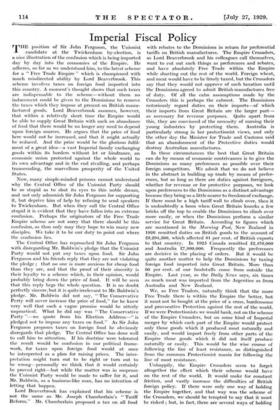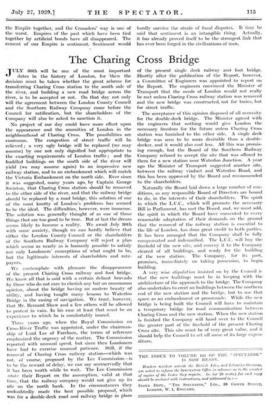Imperial Fiscal Policy
T"position of Sir John Ferguson, the Unionist candidate at the Twickenham by-election, is a nice illustration of the confusion which is being imported day by day into the economics of the Empire. He adheres, so far as we understand him, to the latest scheme for a " Free Trade Empire " which is championed with much misdirected ability by Lord Beaverbrook. This scheme involves taxes on foreign food imported into this country. A moment's thought shows that such taxes are indispensable to the scheme—without them no inducement could be given to the Dominions to remove the taxes which they impose at present on British manu- factured goods. Lord Beaverbrook assumes, however, that within a relatively short time the Empire would be able to supply Great Britain with such an abundance of food that there would be no longer any need to depend upon foreign sources. He argues that the price of food here would not be increased, and that it might actually be reduced. And the prize would be the glorious fulfil- ment of a great idea—a vast Imperial family exchanging goods within its borders without let or hindrance, an economic union protected against the whole world to its own advantage and in the end rivalling, and perhaps transcending, the marvellous prosperity of the United States.
Now, many simple-minded persons cannot understand why the Central Office of the Unionist Party should be so stupid as to shut its eyes to this noble dream, and not only admonish Sir John Ferguson for supporting it, but deprive him of help by refusing to send speakers to Twickenham. But when they call the Central Office stupid it is evident that they have fallen into an extreme confusion. Perhaps the originators of the Free Trade Empire scheme are not sorry that there should be this confusion, as thus only may they hope to win many new disciples. We take it to be our duty to point out where the confusion lies.
The Central Office has reproached Sir John Ferguson with disregarding Mr. Baldwin's pledge that the Unionist Party would not put any taxes upon food. Sir John Ferguson and his friends reply that they are not violating the pledge ; that no one is more anxious for cheap food than they are, and that the proof of their sincerity is their loyalty to a scheme which, in their opinion, would probably bring down the price of food. It will be seen that this reply begs the whole question. It is no doubt perfectly sincere, but it is quite irrelevant to Mr. Baldwin's pledge. Mr. Baldwin did not say, " The Conservative Party will never increase the price of food," for he knew very well that such a vague promise would be utterly unpractical. What he did say was " The Conservative Party "—we quote from his Election Address—" is pledged not to impose any taxes on food." As Sir John Ferguson proposes taxes on foreign food he obviously disregards that pledge. The Central Office has done well to call him to attention. If his doctrine were tolerated the result would be confusion in our political frame- work, for taxes upon foreign food would at once be interpreted as a plan for raising prices. The inter- pretation might turn out to be right or turn out to be wrong—personally we think that it would certainly be proved right—but while the matter was in suspense the Unionist Party would be made to suffer for it, and Mr. Baldwin, as a business-like man, has no intention of letting that happen.
Lord Beaverbrook has explained that his scheme is not the same as Mr. Joseph Chamberlain's " Tariff Reform." Mr. Chamberlain proposed a tax on all food with rebates to the Dominions in return for preferential tariffs on British manufactures. The Empire Crusaders, as Lord Beaverbrook and his colleagues call themselves, want to cut out such things as preferences and rebates, and have absolutely Free Trade within the Empire while shutting out the rest of the world. Foreign wheat, and meat would have to be firmly taxed, but the Crusaders say that they would not approve of such taxation until the Dominions agreed to admit British manufactures free of duty. Of all the calm assumptions made by the Crusaders this is perhaps the calmest. The Dominions notoriously regard duties on their imports—of which their imports from Great Britain are the larger part— as necessary for revenue purposes. Quite apart from this, they are convinced of the necessity of nursing their young industries by protecting them. Australia is particularly strong in her protectionist views, and only the other day the Minister for Trade and Customs said that an abandonment of the Protective duties would destroy Australian manufactures.
In these circumstances the best that Great Britain can do by means of economic contrivances is to give the Dominions as many preferences as possible over their foreign competitors. We admit that we do not believe in the abstract in building up trade by means of prefer- ences, but so long as there are duties against foreigners, whether for revenue or for protective purposes, we look upon preferences to the Dominions as a distinct advantage because they bring us a little nearer to freedom of exchange. If there must be a high tariff wall to climb over, then it is undoubtedly a boon when Great Britain knocks a few bricks off the top to enable the Dominions to climb over more easily, or when the Dominions perform a similar service for Great Britain. According to figures which are mentioned in the Morning Post, New Zealand in 1926 remitted duties on British goods to the amount of N3,294,500, which affected 81 per cent. of British exports to that country. In 1925 Canada remitted £2,470,000 and Australia £7,800,000. Frequently the preferences are decisive in the placing of orders. But it would be quite another matter to help the Dominions by taxing foreign food imported into Great Britain. More than 60 per cent. of our foodstuffs come from outside the Empire. Last year, as the Daily News says, six times as much meat was imported from the Argentine as from Australia and New Zealand.
We, as Free Traders, naturally think that the more Free Trade there is within the Empire the better, but it must not be bought at the price of a crass, burdensome and provocative Protection against the rest of the world. If we were Protectionists we would bank, not on the scheme of the Empire Crusaders, but on some kind of Imperial merger by which each part of the Empire would protect only those goods which it produced most naturally and easily, and would import freely from other parts of the Empire those goods which it did not itself produce naturally or easily. This would be the wise course of following the line of least resistance, as distinguished from the common Protectionist mania for following the line of most resistance.
Unhappily, the Empire Crusaders seem to forget altogether the effect which their scheme would have on the rest of the world. It would make for constant friction, and vastly increase the difficulties of British foreign policy. If there were only one way of holding the Empire together, and that way was the scheme of the Crusaders, we should -be tempted to say that it must be risked ; but, in fact, there are several ways of holding theEriipiie tokether, and the Crusade's' way is one of the worst. Empires of the past which have been tied together by artificial bonds have all disappeared. The cement of our Empire is sentiment. Sentiment would hardly survive the strain of fiscal disptitei. It 'ilia), -be said that sentiment is an intangible thing. Actually, it has already proved itself to be the strongest link that has ever been forged in the civilizations of men.



































 Previous page
Previous page